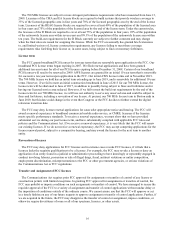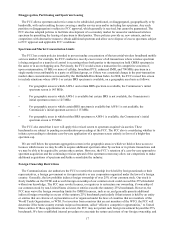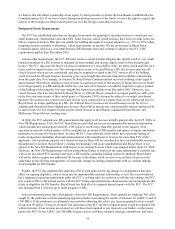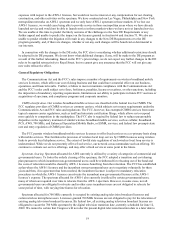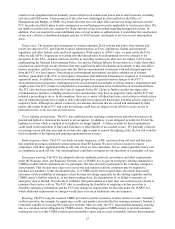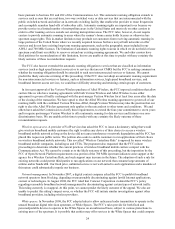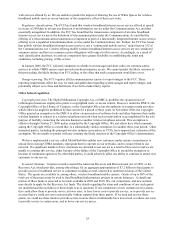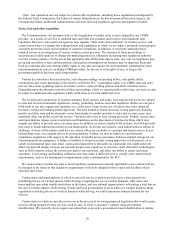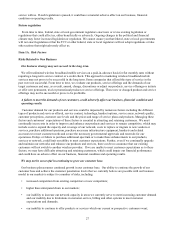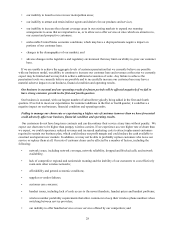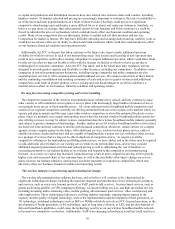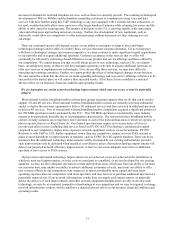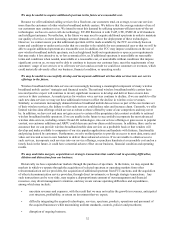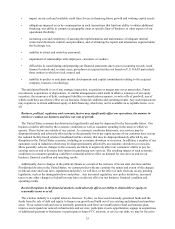Metro PCS 2008 Annual Report Download - page 34
Download and view the complete annual report
Please find page 34 of the 2008 Metro PCS annual report below. You can navigate through the pages in the report by either clicking on the pages listed below, or by using the keyword search tool below to find specific information within the annual report.
25
with services offered by us. We are unable to predict the impact of allowing the use of White Spaces for wireless
broadband mobile services on our business or the competitive effect of these new rules.
Regulatory classifications. The FCC has found that wireless broadband Internet access service offered at speeds
in excess of 200 kbps in at least one direction is an information service under the Communications Act, and thus
essentially unregulated. In addition, the FCC has found that the transmission component of wireless broadband
Internet access service meets the definition of telecommunications under the Communications Act and that the
offering of a telecommunications transmission component as part of a functionally integrated Internet access service
offering is not a regulated telecommunications service under the Communications Act. Further, the FCC has found
that mobile wireless broadband Internet access service is not a “commercial mobile service” under Section 332 of
the Communications Act. Carriers offering mobile wireless broadband Internet access services are not considered
common carriers and have no common carrier obligations with respect to this service. Accordingly, as a result of
such classification decisions, we and our competitors have greater flexibility in establishing the terms and
conditions, including pricing, of this service.
In January 2008, the FCC solicited comments on whether text messages and short codes are common carrier
services to which CMRS carriers must provide non-discriminatory access. We cannot predict the likely outcome of
this proceeding, the likely timing of an FCC ruling, or the effect that such a requirement would have on us.
Outage reporting. The FCC requires all telecommunications carriers to report outages to the FCC. These
reporting requirements affect the way we track and gather data regarding system outages and repair outages, and
potentially subject us to fines and forfeitures if we fail to make timely reports.
Other federal regulation
Copyright protection. The Digital Millennium Copyright Act, or DMCA, prohibits the circumvention of
technological measures employed to protect a copyrighted work, or access control. However, under the DMCA, the
Copyright Office of the Library of Congress, or the Copyright Office, has the authority to exempt certain activities
which otherwise might be prohibited by that section for a period of three years. In November 2006, the Copyright
Office granted an exemption to the DMCA to allow circumvention of software locks and other firmware that enable
wireless handsets to connect to a wireless telephone network when such circumvention is accomplished for the sole
purpose of lawfully connecting the wireless handset to another wireless telephone network. This exemption is
effective through October 27, 2009 unless extended by the Copyright Office. We and others have filed comments
asking the Copyright Office to extend this, or a substantially similar exemption, for another three-year period. Other
interested parties, including the principal wireless industry association, or CTIA, have opposed any extension of this
exemption. We are unable to predict with any certainty the likely outcome of the Copyright Office’s determination.
We have implemented a service called MetroFlash that enables new customers under certain circumstances to
unlock their existing CDMA handsets, reprogram them to operate on our networks, and to connect them to our
network. If a significant number of new customers are attracted to our service as a result of this service and we are
unable to continue this service, either because of the failure of the Copyright Office to extend the exemption or
because of complaints against us by other third parties, it could adversely affect our ability to continue to attract new
customers to our service.
Economic Stimulus. Congress recently enacted the American Recovery and Reinvestment Act of 2009, or the
Recovery Act, which provides, among other things, for an aggregate appropriation of $7.2 billion to fund grants to
provide access to broadband service to consumers residing in rural, unserved or underserved areas of the United
States. The grants are available to, among others, wireless broadband mobile carriers. Grants of up to 80% of the
total cost of the project may be used to fund broadband infrastructure projects in certain instances. A significant
portion of these funds is expected to be made available in 2009 and 2010. We, our competitors, and new entrants
may decide to apply for the Recovery Act funds. The details regarding the terms and conditions of any such grants
are unsettled and the usefulness of these funds to us is uncertain. If our competitors or new entrants receive grants,
this could allow them to provide service at lower rates, to have lower costs to provide service, or to provide service
in areas that we could not serve economically without support from these grants. If we seek and receive these
grants, we could use these funds to provide service in areas that we traditionally have not served, to reduce our costs
to provide service in certain areas, and to lower our service prices.



